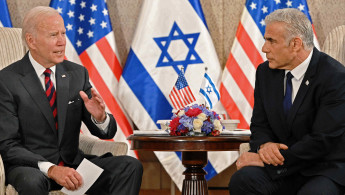Israel's Lapid discusses Iran nuclear deal with Biden
Israeli Prime Minister Yair Lapid discussed Iran's nuclear deal with US President Joe Biden on Wednesday, as Israel makes concerted efforts to block a return to the 2015 accord.
With momentum building to revive the nuclear deal, Israel has waged a last-minute offensive to convince allies to halt talks.
This campaign has seen its defence minister and security adviser both visit Washington, and its spy chief is due to do so next week.
#BREAKING: #Israel's Prime Minister @yairlapid had a call with @POTUS today. Israeli readout below. "Prime Minister Lapid and President Biden spoke at length about the negotiations on a nuclear agreement" with #Iran. pic.twitter.com/wsCTHEuimi
— Jason Brodsky (@JasonMBrodsky) August 31, 2022
Lapid and Biden "spoke at length about the negotiations on a nuclear agreement, and the various efforts to stop Iran's progress towards a nuclear weapon", a statement from the premier's office said.
The two also discussed regional developments including "Iran's terrorist activity in the Middle East and beyond", the statement added.
"In this context, the Prime Minister commended the President on the United States' most recent strikes in Syria."
Last week US forces launched air and artillery strikes in eastern Syria that killed four militants.
Biden later said the strikes aimed "to deter the Islamic Republic of Iran and Iran-backed militia groups from conducting or supporting further attacks on United States personnel and facilities".
During Wednesday's call, Biden "emphasised his deep commitment to the security of the State of Israel, and to preserving its ability to face any enemy or threat", the Israeli statement said.
Israel has long opposed a revival of the 2015 nuclear deal, known as the Joint Comprehensive Plan of Action, that would grant its arch-nemesis Iran sanctions relief in exchange for curbs on its nuclear programme.
Lapid told journalists last week that the existing agreement "is a bad deal".
"It would give Iran $100 billion a year" that would be used by Iran-backed militant groups Hamas, Hezbollah and Islamic Jihad, Lapid added.





 Follow the Middle East's top stories in English at The New Arab on Google News
Follow the Middle East's top stories in English at The New Arab on Google News
![The UAE is widely suspected of arming the RSF militia [Getty]](/sites/default/files/styles/image_330x185/public/2024-11/GettyImages-472529908.jpg?h=69f2b9d0&itok=Yauw3YTG)
![Netanyahu furiously denounced the ICC [Getty]](/sites/default/files/styles/image_330x185/public/2024-11/GettyImages-2169352575.jpg?h=199d8c1f&itok=-vRiruf5)
![Both Hamas and the Palestinian Authority welcomed the ICC arrest warrants [Getty]](/sites/default/files/styles/image_330x185/public/2024-11/GettyImages-2178351173.jpg?h=199d8c1f&itok=TV858iVg)